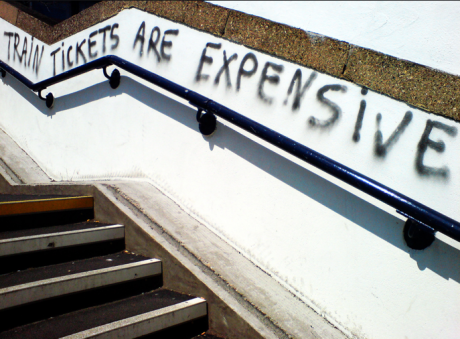
14 January 2015
Cat Hobbs discusses why rail privatisation doesn't work, and never will. This blog post was first published in Open Democracy.
I was recently a guest on a BBC 5 Live debate where my opponent (from the Institute for Economic Affairs) was practically making the case against rail privatisation for me. She acknowledged that fares are too high and carriages are overcrowded. Her analysis was that a purer form of privatisation would solve these problems by giving train companies more freedom. As a frustrated passenger myself, I find it hard to believe that more privatisation is the answer. That if only train companies had less regulation to deal with, they'd be reducing my fares and providing more carriages. The reality is that we've given privatisation a fair shot and it's about time we started doing things differently. Here are my top three reasons why privatised rail can't be sustained long term.
1) Fare rises are unsustainable
At the start of the year, angry passengers were protesting at railway stations around the country about high fares and calling for public ownership. Since privatisation, the average price of a train journey has increased by 22% in real terms. We've known for a while that public ownership of rail would save money - £1.2 billion according to the 'Rebuilding Rail' report, which mainly looked at the costs of fragmentation. This equates to a fare cut of 18% across the board. Our own recent research with Corporate Watch looked at the cost of energy and water bills along with rail fares, and found that households would save around £250 a year if energy, water and rail were in public ownership. (This research didn't consider the issue of fragmentation but just looked at the savings that could be made by taking out shareholder profits and allowing for a lower cost of borrowing for government.) At £13 a year, rail is by far the smallest part of this 'cost of privatised living' (everyone uses energy and water, not everyone takes the train). But for those people who do commute or take the train regularly, their savings on train tickets would be much higher than this average.
2) Network Rail's debt is unsustainable
In September of last year, the Office for National Statistics reclassified Network Rail as a central government body. As CRESC (University of Manchester) outlines in its report 'The Conceit of Enterprise', Network Rail operates as a kind of 'philanthropic landlord' to the rail industry, while its own debt rises. Train companies benefit from indirect subsidies provided through low track access charges and high government investment. Despite this, the average age of trains is higher than it was in 1996 and there has only been a 3% increase in new carriages since 1994/5. Now that Network Rail's £34 billion debt mountain is officially on the government's balance sheet, it seems likely that there will be more debate about how we should manage our railway network.
3) The ideology of privatisation is unsustainable
It is getting harder to argue that public ownership doesn't work when the evidence shows so strongly that it does. The East Coast line has demonstrated that our railways can be run successfully and profitably in public ownership, with profits - £1 billion in this case since 2009 – being returned to the Treasury. It was recently revealed that foreign taxpayer-owned companies received £102 million in dividends from UK train fares in the past two years. Instead of using rail profits to improve services and reduce fares, we are choosing, in effect, to subsidise passengers in other countries, because of an ideological commitment to franchising. Right now the government is not questioning this approach: East Coast is being reprivatised; the state-owned Abellio has been given the ScotRail franchise and will use profits to improve services for Dutch passengers. However, this situation gives the lie to the idea that only private companies can run a railway. Privatisation is still winning the battles but perhaps it is starting to lose the war.
The public is rightly suspicious of privatised rail – only one in three of us trusts the rail industry to act in our best interests, and 66% of us want to see rail in public hands. Politicians are starting to shift too - Labour, the Liberal Democrats and the SNP want to make it possible for the public sector to bid to run railways, while Plaid Cymru and the Greens want public ownership across the board. (Check out our scorecard 'Privatisation: People vs Politicians' for more on this.)
The idea that our railway would work better if it operated more like a 'pure' free market is attractive. But in practice, the market in rail was only ever the invention of ideologues. Passengers don't choose their trains the way they choose between chocolate bars. They're travelling from A to B, along one railway line, and they pay the price they're told to pay. It's increasingly clear that the price we're all paying, as passengers and as a society, is much too high to be sustainable.

Photo by Nico Hogg and used under the Creative Commons license.

Comments
MK commuter replied on Permalink
I so agree that we do not make travel choices like chocolate bars. It's not only rail, it's buses as well. Have you ever stood in the rain at a bus-stop and had to choose between waiting for a bus from another company or paying a marginally more expensive fare? On a few train lines/routes there are 2 different operators, but I don't think that any 'competition' between them is really like for like for a host of reasons. And it leads to companies fighting to run existing 'profitable' routes and no improvement in areas where public transport links need to be developed.
Add new comment